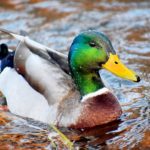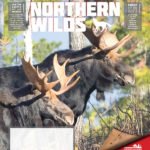The difference between here and there is striking. Drive Highway 61 along Lake Superior’s North Shore in autumn and you’ll encounter endless traffic as hordes of visitors scurry northward to enjoy the fall foliage. For merchants, restaurants and state parks along the drive, this is a busy season. But that’s there.
Out here, you’ll see hardly anyone. “Here” is the back country of the North Shore, beyond the popular Superior Hiking Trail, the well-marked fall color driving tours and thoroughfares such as the Gunflint Trail. It’s the places you find when you take a minimally maintained logging road to a grouse covert, a lonely beaver pond or a secluded lake with just a footpath for an access. I like it out here.
On a recent morning, I watched dawn break across a marsh. Mallards had been there two days previous. I tossed out a handful of decoys and settled into the alder brush with the dog, hoping the ducks were still in the vicinity. I watched the sun rise, enjoyed the fiery colors of maples on distant ridge tops and listened to the gossip of unseen trumpeter swans. The mallards never appeared. After an hour I picked up the decoys and went home to get ready for work; empty-handed, but satisfied. Is there a better way to start your day?
Outside, I seek solitude. Step away from the North Shore’s crowds and it is easy to find. This is because the vast majority of lands and waters are public property, primarily the Superior National Forest intermixed with state-owned forest land. Cook County, where I live, contains over 90 percent public land. Not everyone views this fact from a positive perspective. Developers complain the public holdings limit their ability to build second homes that sit vacant most of the year. Politicians bemoan the loss of a tax base to provide them with more tax revenues to spend. I’ve yet to hear any of them put forth a credible argument about how this “growth” would better our lives, much less the North Shore’s wild places.
What the small-town boosters always fail to acknowledge is that our public lakes and forests represent a great wealth we hold in common. Many, likely most, people who live on or visit the North Shore are here to enjoy that wealth. Because public land and water belongs to all of us, we are free to use it. Of course, that freedom comes with a price. Collectively, we spend so much on gear, food, lodging, travel and the like that outdoor recreation is among the nation’s largest industries. You really don’t have to look beyond those lines of traffic on Highway 61 to know that this is true.
Unfortunately, many lawmakers are either blind to this reality or choose to ignore it. A national movement to give up public lands, beginning in western states, is alive and well. The argument for doing so is that other entities—states, counties, private owners—would be better stewards of land that belongs to all of us. This is just specious coverup of attempt to rob Americans of our lands and the wealth of natural resources they contain.
Out here, politics and politicians are far, far away. I have the freedom to go where I please and enjoy a wondrous, natural world. It’s a freedom that is difficult to find in places where the landscape is divided and defined by private property boundaries. I guess that’s why when I travel to hunt, fish or just enjoy nature, it is always to somewhere with ample public lands and waters.
Some folks seem to think that enjoying outdoor recreation on public, rather than private land is somehow a lesser experience because you have to share it with others. Sometimes this is true, such as on small public tracts in the farming region on the opening day of pheasant season. That said, nearly all of my pheasant hunting occurs on public land. When it comes to deer hunting, many hunters believe their chances are better on private land. This may be true in areas where public land is limited and thus heavily used. In contrast, northern Minnesota has millions of acres of public forest land. While many hunting parties have used the same public tracts for generations, elbow room exists.
I choose to hunt on public land because elbow room is important to me. I was fortunate enough to grow up hunting in places where you could walk as far as your legs would take you. If you didn’t know how to use a compass, it was even possible to get lost. These early experiences instilled a love for big country that continues to define me as a hunter.
Big country. Those two words have long inspired the American imagination and wanderlust. A quest for big country carried European colonists across the North American continent. Later, when all the West was won, it was a love of big country that compelled early conservationists like Teddy Roosevelt to begin protecting the wildest places as national parks and wildlife refuges and to restore ravaged landscapes by creating national forests. Today these lands and waters are our American legacy, our common wealth.
Big country. Unless you are one of a very privileged few who owns or has unfettered access to a vast private ranch or estate, the only place you can experience it is on public land. For some, this may be the canoe country wilderness. For others, its just plain, old northern Minnesota woods. The where matters less than the fact that Minnesota still has lots of big country. And nearly all of it is public land.
I’ll never understand the mindset of people who look at a wild lake shoreline and see only a place to build a second home or a whole subdivision of them. Even worse are those who regard public land as ground that needs to be developed to its highest and best use, whatever that may be. Too many folks fail to make the connection between public wild lands and a healthy landscape that provides clean water, abundant wildlife and renewal for our souls. They don’t know what they are missing.






